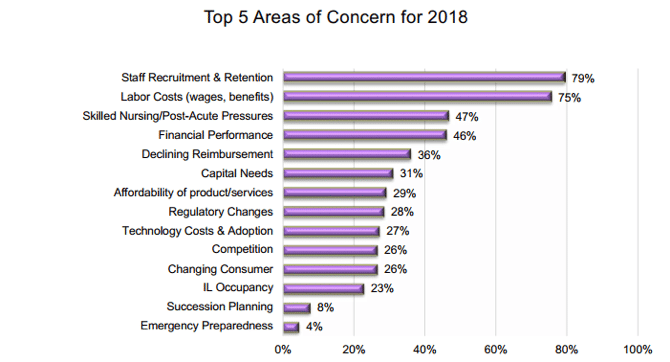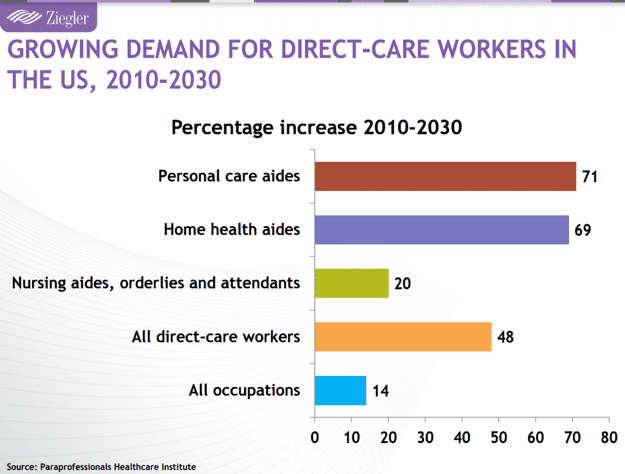Ask any senior living leader what keeps him or her up at night, and you’ll quickly hear the words “staff recruitment and retention.” In a survey of CFOs by Ziegler, 80% of respondents said it was one of their top concerns for 2018. According to Argentum, senior living communities need to recruit 1.2 million workers, while reducing the current 45% turnover rate for senior care professionals.

Credit: Ziegler CFO Hotline
In a recent Senior Housing News roundtable, Vi President Randy Richardson noted, “Depending on what survey you look at, by 2025 we’ll be short over a million caregivers in the system. So where are those people going to come from?” Ken Jaeger, founder and CEO of MorningStar Senior Living, added, “I just hate getting a family member letter saying you’re understaffed or there’s some openings in your community. We’re doing everything it takes to be at staff. We like to overstaff because we know with turnover, people are being pulled away. I’d like to follow the Chick-fil-A model. It has an aggressive recruitment plan. It has a career path for its team members and one of the lowest turnover rates in the country and in the fast food industry.”
Others are joining in on the effort. Argentum recently created Senior Living Works, an all-encompassing resource to inspire its workforce and recruit for the future. Love & Company created a video for LeadingAge PA called “Make A Career Out of Making a Difference” to recruit millennials into senior living. Many other states are now requesting the video to be edited for their recruitment efforts.

Credit: Ziegler
A McKnight’s Senior Living article captured numerous other recruitment efforts including those by two larger senior living organizations, Vi and Ecumen. Vi at Bentley Village opened its doors to gerontologic nursing students of Florida Gulf Coast University’s nursing program. The students completed a clinical rotation at the nearby Vi community and gained important healthcare experience while also being exposed to working with residents. Ecumen is also inviting students into its communities. Thanks to a $1.95 million grant from the Margaret A. Cargill Foundation, the organization has created the Ecumen Scholars Program that enables local nursing students to enjoy an internship while receiving a stipend. Asbury offers nursing scholarships at several of its communities in collaboration with the Asbury Foundation, recognizing that career development in this area of need is critical.
Immigration and millennials
Historically, a large number of caregiver jobs have been filled by immigrants, skyrocketing from 520,000 in 2005 to approximately one million in 2015. One in four of the front-line staff in assisted living, nursing care and home care agencies is foreign-born, according to an analysis completed by R.H.I., a New York research firm. All of this has raised serious recruitment concerns for healthcare organizations who are worried about how tightened entry into the United States will affect the availability of healthcare workers. Homeland Security is significantly reducing the number of immigrants granted Temporary Protected Status (TPS), which allows them to live and work legally in the United States. In addition to fewer immigrants entering the country, tens of thousands will also lose TPS in the coming years and face deportation.
“As an employer of choice, it’s our job to convey the exciting opportunities that senior living provides. This is such an interesting time for aging services organizations,” says Manny Ocasio, EVP of Human Resources at Asbury Communities, the nation’s 15th largest system of not-for profit Life Plan Communities. Manny continues, “The dynamics of the people we serve and the people who will serve them are very, very different. On the one hand, you have an older, primarily white resident being attended to by an ethnically diverse front-line employee, who is most likely a millennial. Millennials (those born between 1982 and 2003) will account for half the workforce by 2020 and 75% by 2030, so we need to know how to attract them. Fortunately, I believe that organizations like ours, who have a greater purpose with a higher calling are particularly appealing to millennials. There is something spiritual about serving a human being who is right in front of you.”
This sense of purpose among Asbury’s associates was on full display in May, as Asbury engaged – and celebrated – its associates through Work Inspired, a Facebook campaign where associates shared what inspires them, important life lessons they have gained, and the special relationships they have formed on the job.

Tools for recruitment
Asbury believes that a key to recruiting millennials is to demonstrate a culture of true listening and communication. The new Associate App demonstrates Asbury’s commitment to dialog. The smartphone app has dramatically increased the number of front-line staff members who now have an opportunity for two-way communication with their managers.
Another tool that Asbury has developed and grown is its Leadership Development Institute. This three-day training event is lead through the Asbury Support & Collaboration Center in Frederick, Maryland for system leaders, including managers and up-and-coming associates. Training includes programs and activities where team members can develop their leadership skills with a focus on collaboration and listening. Many of these high-potential people are Millennials. Manny sums it up, “We’re looking to develop a diverse group of leaders who excel at collaboration…leaders who are able to demonstrate that they are listening.”
Asbury’s CEO Doug Leidig chimes in, “We’re implementing some amazing, cutting-edge approaches to our healthcare efforts, all to improve the lives of those we serve and our staff … from implementing telehealth with TripleCare to launching our Associate App to improve communication with the front-line associates. Another example of striving to provide both our residents and staff with the best is the Planetree® person-centered training that every Asbury skilled-care employee undergoes. We know that not only does resident satisfaction go up with a fully implemented, person-centered approach, but so does staff morale. Our goal is to be the ‘provider of choice’ and we know we can’t do that without also being the ‘employer of choice.’”
Great talent craves great culture
“Several business school studies have dispelled the nagging myth that companies that do well and have money to invest in good cultures have the best cultures. Rather, longitudinal research using Great Place to Work data has shown that it’s good cultures that lead to companies doing well.” notes Jacquelyn Kung, PhD, of Activated Insights whose firm partners with Fortune Magazine’s “Best Workplaces in Aging Services” list. One key measurement for making the list is the Trust Index. Twenty years of research across industries have demonstrated several statistically significant benefits of scoring well on the Trust Index™ employee engagement score:
- Lower employee turnover
- Fewer workplace injuries
- Higher customer satisfaction
- Higher revenue growth
- Higher EBITDA margins
Jacquelyn continues, “As an industry, we have long said that employee engagement leads to happier residents which leads to better performance.”
Want to go more in depth about preparing your community for the future of senior living staffing needs and how to succeed with your recruitment goals?
Watch this recorded webinar presentation by Manny Ocasio, EVP of Human Resources at Asbury Communities, Dr. Jacquelyn Kung, CEO of Activated Insights, and Tom Mann, Principal of Love & Company!
Next up:
The Age of Disruption: Part V, Life Expectancy – The Truth about Our Future
Previous:
The Age of Disruption: Part III, The Reasons for Growth
The Age of Disruption: Part II, The Power of Place
The Age of Disruption: Part I, The Wolf at the Door
For more information about how Love & Company can help your community stay ahead of the curve during this “age of disruption,” contact Tim Bracken at 410-207-0013, or request a free assessment!




